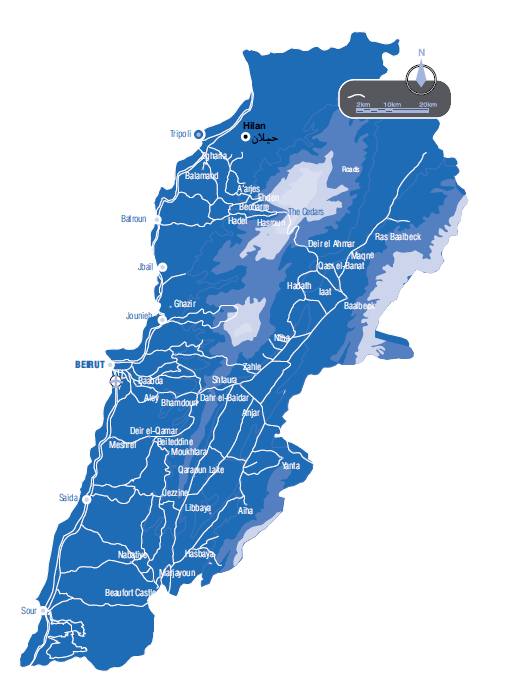Hilan-Owned by a Maronite and hosting both Sunni and Orthodox
Etymology
The Arabic hilan means an old wooden thresher with iron rings inside, which was used at some time in the past to separate grains, namely wheat, from stalks and straws. Chances are the town acquired its name because the residents had a knack for making threshers. Another assumption by The author Anis Fraiha suggests in his book The Names of Lebanese Towns and Villages that the word means ‘the powerful and sturdy’. It could be that these features were distinct qualities of the town’s inhabitants.
Location
Hilan is situated in the Qada’a of Zgharta towards the Mennieh and Dennieh side, near Wadi Jhannam. It rests at an altitude of 300 meters above the sea level and stretches across 492 hectares. It is 100 kilometers from Beirut and seven kilometers from Zgharta. It may be reached through Tripoli to Erdeh and from there to Meryata, Ashash and finally to Hilan.
Population
Hilan’s registered population is estimated at 2800, the majority of whom, i.e 75%, are Sunni while the Orthodox make up the remaining 25%. Having suffered displacement in the 1975 Civil War, and the residents of Hilan, particularly the Christians, are yet to return to their town, which currently has only 100 residential units. The largest portion of Hilan’s plots of land belongs to the Zgharta’s former Maronite MP, Semaan Doueihi, which hampers the possibility of further urbanization of the town.
Voters
Hilan’s registered voters amounted in 2000 to 1236 of whom 512 turned out for the elections. The number rose in 2009 to 1611, of whom 817 voters cast their ballots. Voters are distributed over the following families:
Orthodox
Laqis: 63 voters Toulaije: 60 Habaq: 60 Sawan: 51
Nqoula: 47 Barbara: 45 Hayek: 30 Rizk: 20
Zeina: 11 Wehbi: 10
Sunni
Shamma (largest family): 567 voters
Al-Mir: 125 Ismail: 115
Hawa: 75 Akoumi: 64 Halloum: 61 Skaff: 46
Ahmad : 40 Adouj: 30
Al-Massri: 21 Al-Sheikh: 12
Rashid: 10 Rabah: 7
Local Authorities
The town is administered by a Mukhtar, currently Abboud Khodr Shamma, and a three-member ikhtiyariyah body.
Educational Institutions
The town’s official school was closed down and students had to enroll at the neighboring schools, mainly those in the town of Meryata.
Economic Life
Residents live off agriculture as the town’s coastal location has made it ideal especially for growing fruit and vegetables.








Leave A Comment